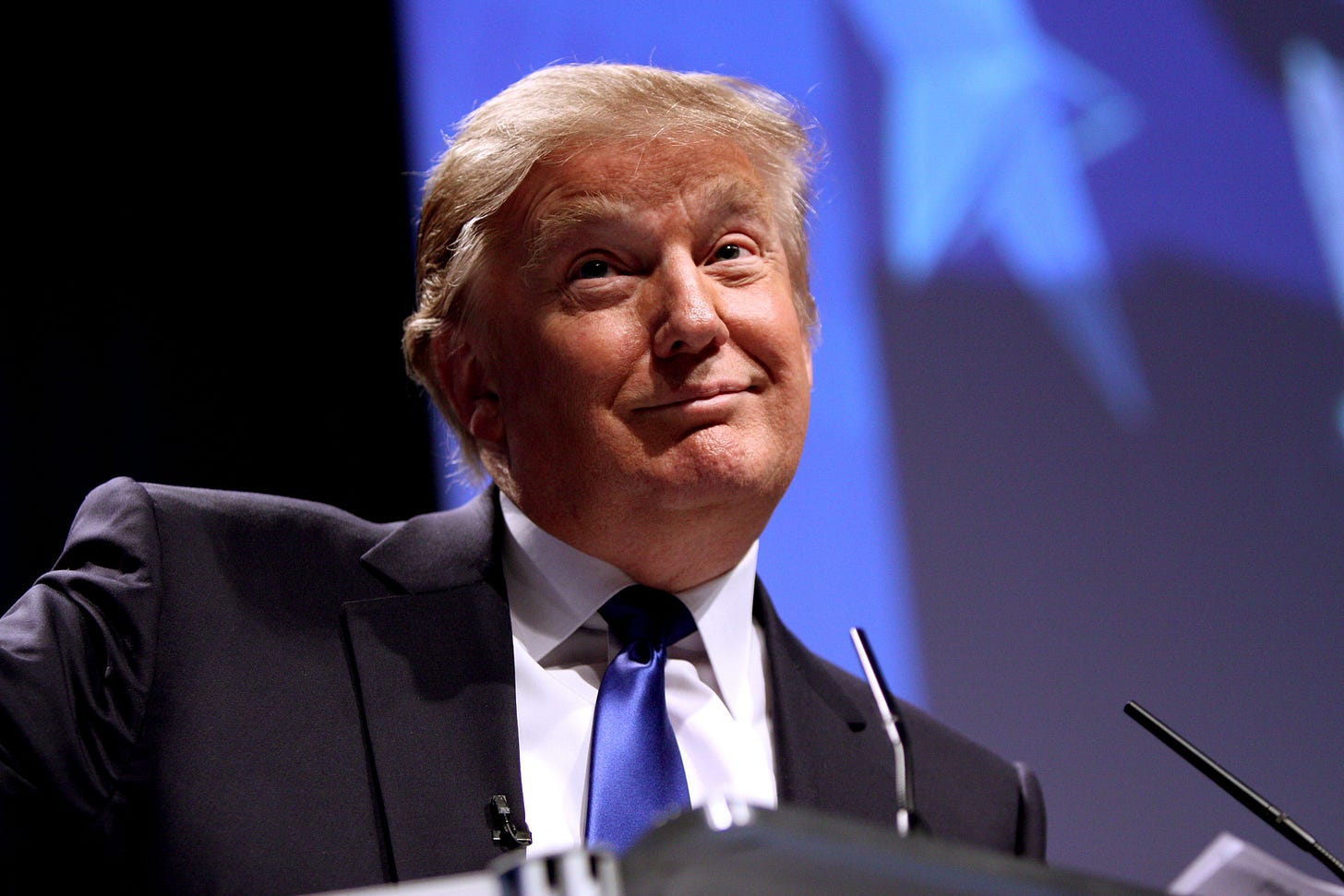Keeping track of the latest threats to democracy
The growing list of perceived dangers now includes a wide range of concepts — everything from Donald Trump to the US Constitution.
Each new week seems to bring a new and imminent threat to democracy — especially if you pay any attention to mainstream academics and media pundits. The ever-expanding list of fundamental dangers to the democratic process includes: Donald Trump (of course), free speech, the US Constitution, and even climate change. Let’s dive into how these concerns are being framed and what they reveal about the current state of political discourse (or lack thereof).
1. Donald Trump: The Ultimate Threat
Turkish American economist and MIT professor, Daron Acemoglu, posits that Donald Trump is a greater threat to American democracy today than he was in 2016. In an op-ed for Project Syndicate, he argues that American institutions were not designed to handle an autocratic populist willing to break norms and laws. The claim here is that while American democracy survived Trump’s first term, it was only because voters and civil society stood up. However, Acemoglu says Trump’s ability to exploit institutional weaknesses, deepen societal divisions, and attempt to overturn an election loss is evidence that he poses a continued and growing danger.
The rhetoric underscores an accelerating liberal fear: Trump is not just a controversial figure, he’s a systemic threat. Yet, while some who oppose him label Donald Trump as an existential threat to democracy, they simultaneously use the same democratic institutions — like the courts, elections, and the media — to challenge him, criticize him, and ultimately work to keep him in check. This shows that the institutions they claim are at risk of collapsing under his influence are, in fact, still functioning robustly enough to oppose him.
This contradiction might indicate that the real issue is not a genuine collapse of democratic systems, but rather a deep ideological inflexibility or unwillingness to accept that democracy inherently includes diverse, sometimes conflicting viewpoints and political figures, including those like Trump. It suggests that the alarm over systemic threats may be more about a struggle to maintain ideological dominance than about actual institutional failure.
2. Free Speech Under Fire
In Brazil, Justice Alexandre de Moraes just ordered the shutdown of X (formerly Twitter), explicitly targeting what he sees as dangerous populist speech that might influence upcoming elections. It’s a move widely criticized across the globe. Brendan Carr, head of the US Federal Communications Commission, took to the platform to condemn de Moraes for using events like Brexit and Trump’s 2016 election as justification for his sweeping censorship.
de Morea (sic) argues that free speech on X cannot be allowed to continue because the diversity of political opinions expressed on the site might influence the people of Brazil ahead of their 2024 elections.
In other words, de Morea is arguing that free speech is a threat to democracy—a position that is as Orwellian as it is dangerous.
The opposite is true. Free speech is democracy’s check on excessive government control. Censorship is the authoritarian’s dream.
Carr is right in raising Orwellian concerns. In fact, just this past week, Facebook’s Mark Zuckerberg admitted to censoring posts during the pandemic. If diversity of political opinion is seen as harmful, what does that say about the resilience of democracy itself? Are we really defending democracy, or are we defending a narrative that aligns with specific ideological preferences?
3. The Constitution: A Flawed Foundation?
Read that headline and sub-headline.
Now read it again. And if it doesn’t absolutely blow your mind, do it a third time because the article itself, from none other than The New York Times, must surely be the strangest perversion of our nation’s founding document. The very one that actually allows the Times to write such pap.
Nevertheless, The New York Times and a growing body of liberal scholars are critiquing the US Constitution itself, suggesting it perpetuates a “tyranny of the minority.” Their argument points to structural issues within the American political system that allow smaller, less diverse segments of the population to wield disproportionate power.
One of the most vocal cheerleaders for a rethink of our nation’s founding document is the dean of Berkeley’s Law School, Erwin Chemerinsky. Here’s what he wrote in a recent LA Times op-ed:
No matter the outcome of the November elections, it is urgent that there be a widespread recognition that American democracy is in danger and that reforms are essential. No form of government lasts forever, and it would be foolhardy to believe that the United States cannot fall prey to the forces that have ended democracies in many other countries.
Although the causes are complex, many of today’s problems can be traced back to choices made in drafting the Constitution, choices that are increasingly haunting us. After 200 years, it is time to begin thinking of drafting a new Constitution to create a more effective, more democratic government.
Criticisms of the Constitution are part of an enduring debate about how to balance stability with evolving societal needs. But labeling the Constitution itself as a threat overlooks its role as a cornerstone of American governance that, despite its flaws, has upheld democratic principles for over 200 years. Calls to view it as ‘outdated’ or ‘inherently dangerous’ undermine the foundational values that have supported this nation's resilience and adaptability throughout its history. The focus should be on preserving, respecting and upholding the Constitution and bringing its principles to life in a modern context, rather than dismantling it simply because it doesn’t align with a woke, fleeting ideology.
4. Climate Change: A New Political Battleground
David Orr, a professor at Arizona State University, is speaking at an upcoming event about climate change as not just an environmental or economic issue but a profound danger to democracy itself. His description paints a grim picture: searing heat, massive storms, and climate refugees all contributing to social instability and threatening the very fabric of democratic societies.
Conflating climate change with an immediate threat to democratic governance risks politicizing the issue beyond recognition. The real challenge lies in the use of fear-based tactics, particularly around climate change, to unravel the very fabric of our society.
When every issue is framed as a crisis that demands immediate, drastic action, it becomes a tool to push specific agendas rather than fostering genuine dialogue. The true danger isn't the challenges themselves, but the growing tendency to view them through a partisan lens, which hampers our ability to find practical, actionable solutions that could effectively address real pressing concerns without undermining societal cohesion.
The bigger picture
The common thread running through these warnings is the growing inclination to label divergent opinions, figures, and even foundational documents as threats to democracy. The rush to brand every perceived obstacle as a “danger to democracy” reflects a deeper struggle within liberal ideology — one that seeks not just to protect democratic institutions but to align them more closely with a singular worldview.
Ironically, the real threat lies in an unwillingness to engage with differing perspectives, an eagerness to censor under the guise of protection, and a tendency to view foundational principles as dispensable when they no longer serve a particular agenda.
The sky isn’t falling — it’s just another storm, one that can be weathered with open dialogue, a commitment to the rule of law of our Republic, and respecting the rights and freedoms enshrined in the very document that appears to be in the crosshairs of the globalist idealogues who have infiltrated the institutions and minds of the nation.





The slight of hand that they are using as the definitions is what you have to watch.
First of all, our country is not a democracy, so there is no protection of that democracy needed. They actually want to use what they term "democracy" to be able to exploit the minority protections that a constitutional republic creates.
They have changed populist to a derogatory term. Our system was specifically set up to eliminate a ruling class. Our government was designed to be run by the people. They want to create a ruling class that will govern the unwashed masses by their betters. They are terrified that someone outside their bureaucratic class will take away their power and upset their plans. Whether it is Trump, Bolsonaro, LePen, Milei, Meloni, Duda, or any other that might be against their goals, the playbook is the same.
The crisis exploitation system also relies on bait and switch. Using climate issues for example, if you don't agree with both the definition of the problem *and* agree to the solutions that they prescribe, you are a denier.
Absolutely nothing concerns me more than the loss of free speech. How people can't understand this astounds me. For the powers that be to state that the Constitution itself is dangerous, and needs to be rewritten is terrifying. Wake up people, now is the time to face the truth.